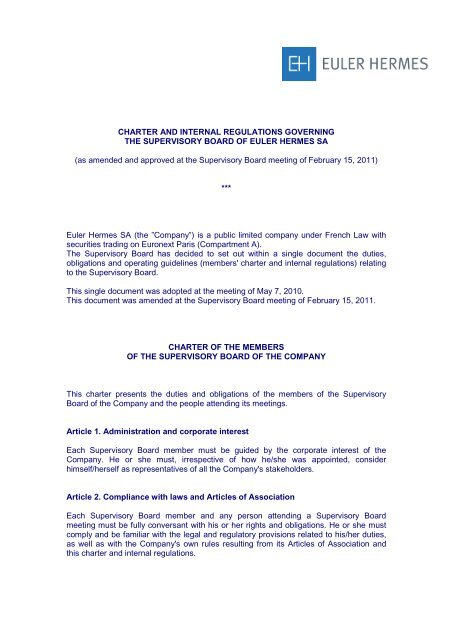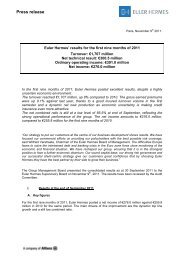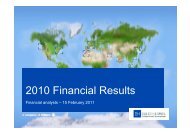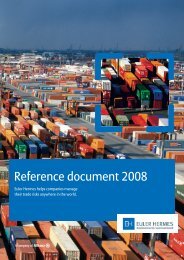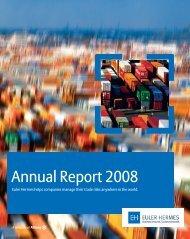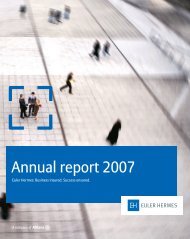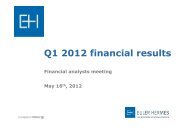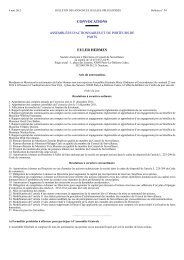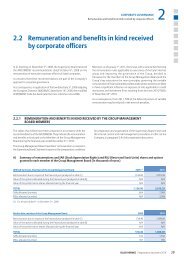Charter and internal regulatâÂÂions of the Supervisory - Euler Hermes
Charter and internal regulatâÂÂions of the Supervisory - Euler Hermes
Charter and internal regulatâÂÂions of the Supervisory - Euler Hermes
Create successful ePaper yourself
Turn your PDF publications into a flip-book with our unique Google optimized e-Paper software.
CHARTER AND INTERNAL REGULATIONS GOVERNING<br />
THE SUPERVISORY BOARD OF EULER HERMES SA<br />
(as amended <strong>and</strong> approved at <strong>the</strong> <strong>Supervisory</strong> Board meeting <strong>of</strong> February 15, 2011)<br />
***<br />
<strong>Euler</strong> <strong>Hermes</strong> SA (<strong>the</strong> ”Company”) is a public limited company under French Law with<br />
securities trading on Euronext Paris (Compartment A).<br />
The <strong>Supervisory</strong> Board has decided to set out within a single document <strong>the</strong> duties,<br />
obligations <strong>and</strong> operating guidelines (members' charter <strong>and</strong> <strong>internal</strong> regulations) relating<br />
to <strong>the</strong> <strong>Supervisory</strong> Board.<br />
This single document was adopted at <strong>the</strong> meeting <strong>of</strong> May 7, 2010.<br />
This document was amended at <strong>the</strong> <strong>Supervisory</strong> Board meeting <strong>of</strong> February 15, 2011.<br />
CHARTER OF THE MEMBERS<br />
OF THE SUPERVISORY BOARD OF THE COMPANY<br />
This charter presents <strong>the</strong> duties <strong>and</strong> obligations <strong>of</strong> <strong>the</strong> members <strong>of</strong> <strong>the</strong> <strong>Supervisory</strong><br />
Board <strong>of</strong> <strong>the</strong> Company <strong>and</strong> <strong>the</strong> people attending its meetings.<br />
Article 1. Administration <strong>and</strong> corporate interest<br />
Each <strong>Supervisory</strong> Board member must be guided by <strong>the</strong> corporate interest <strong>of</strong> <strong>the</strong><br />
Company. He or she must, irrespective <strong>of</strong> how he/she was appointed, consider<br />
himself/herself as representatives <strong>of</strong> all <strong>the</strong> Company's stakeholders.<br />
Article 2. Compliance with laws <strong>and</strong> Articles <strong>of</strong> Association<br />
Each <strong>Supervisory</strong> Board member <strong>and</strong> any person attending a <strong>Supervisory</strong> Board<br />
meeting must be fully conversant with his or her rights <strong>and</strong> obligations. He or she must<br />
comply <strong>and</strong> be familiar with <strong>the</strong> legal <strong>and</strong> regulatory provisions related to his/her duties,<br />
as well as with <strong>the</strong> Company's own rules resulting from its Articles <strong>of</strong> Association <strong>and</strong><br />
this charter <strong>and</strong> <strong>internal</strong> regulations.
Article 3. Performance <strong>of</strong> duties: guidelines<br />
Each member <strong>of</strong> <strong>the</strong> <strong>Supervisory</strong> Board performs his or her duties independently, loyally<br />
<strong>and</strong> pr<strong>of</strong>essionally.<br />
Article 4. Pr<strong>of</strong>ile <strong>of</strong> <strong>the</strong> <strong>Supervisory</strong> Board – Composition in general<br />
According to <strong>the</strong> Company’s Articles <strong>of</strong> Association, <strong>the</strong> <strong>Supervisory</strong> Board has at least<br />
three <strong>and</strong> no more than twelve members who are appointed by <strong>the</strong> Ordinary General<br />
Meeting <strong>and</strong> serve a three year term.<br />
No member <strong>of</strong> <strong>the</strong> <strong>Supervisory</strong> Board may be over 70 years <strong>of</strong> age. If a member <strong>of</strong> <strong>the</strong><br />
<strong>Supervisory</strong> Board reaches this age, this member must automatically resign.<br />
In <strong>the</strong> selection <strong>of</strong> <strong>Supervisory</strong> Board members <strong>the</strong>re will be a balance <strong>of</strong> nationality,<br />
gender <strong>and</strong> age. In addition, <strong>the</strong>re will be a balance in experience <strong>and</strong> affinity with <strong>the</strong><br />
nature <strong>and</strong> culture <strong>of</strong> <strong>the</strong> business <strong>of</strong> <strong>the</strong> Company <strong>and</strong> its subsidiaries (<strong>the</strong> “Group”).<br />
The <strong>Supervisory</strong> Board will consist <strong>of</strong> a mix <strong>of</strong> persons with relevant <strong>and</strong> reasonable<br />
current executive experience in <strong>the</strong> management <strong>of</strong> complex multi-national enterprises,<br />
preferably gained in <strong>the</strong> private sector.<br />
Among its members, <strong>the</strong>re should be a proper array <strong>of</strong> specific know-how with respect to<br />
<strong>the</strong> various aspects <strong>of</strong> <strong>the</strong> business <strong>of</strong> <strong>the</strong> Group. Its members should have an open eye<br />
for <strong>and</strong> should be capable to evaluate international, social, economical <strong>and</strong> o<strong>the</strong>r<br />
development relevant to <strong>the</strong> Group.<br />
Its members should be deemed (or, in <strong>the</strong> case <strong>of</strong> a reappointment, have proven) to be<br />
capable to operate as members <strong>of</strong> <strong>the</strong> <strong>Supervisory</strong> Board as a collegiate body <strong>and</strong> not<br />
as advocates <strong>of</strong> any specific person or group <strong>of</strong> person.<br />
Article 5. Independence <strong>and</strong> duty to speak<br />
Each member <strong>of</strong> <strong>the</strong> <strong>Supervisory</strong> Board must ensure that he or she retains his or her<br />
independence <strong>of</strong> judgment, decision <strong>and</strong> action. He or she undertakes not to be<br />
influenced by any element outside <strong>the</strong> Company’s corporate interest that it is <strong>the</strong>ir duty<br />
to defend.<br />
He or she should disclose to <strong>the</strong> Board any matter that might come to his or her attention<br />
<strong>and</strong> which he/she considers might affect <strong>the</strong> Company's interest. He or she is dutybound<br />
to clearly express his/her questions <strong>and</strong> opinions.<br />
He or she will strive to convince <strong>the</strong> Board <strong>of</strong> <strong>the</strong> relevance <strong>of</strong> <strong>the</strong>ir opinions <strong>and</strong><br />
positions. Should <strong>the</strong>re be disagreement, he or she may request that his/her positions be<br />
recorded in <strong>the</strong> meeting minutes.<br />
Article 6. Independence <strong>and</strong> conflict <strong>of</strong> interest<br />
All members <strong>of</strong> <strong>the</strong> <strong>Supervisory</strong> Board must do <strong>the</strong>ir utmost to avoid any conflict arising<br />
between <strong>the</strong>ir moral <strong>and</strong> material interests <strong>and</strong> <strong>the</strong> interest <strong>of</strong> <strong>the</strong> Company. They must<br />
inform <strong>the</strong> Board as soon as <strong>the</strong>y become aware <strong>of</strong> any conflict <strong>of</strong> interests or potential<br />
- 2 -
conflict <strong>of</strong> interests, <strong>and</strong> subsequently refrain from taking part in discussions <strong>and</strong> voting<br />
on any related resolutions.<br />
According to <strong>the</strong> AFEP-MEDEF code <strong>of</strong> April 2010, <strong>the</strong> criteria to be reviewed by <strong>the</strong><br />
<strong>Supervisory</strong> Board in order to qualify a member as independent <strong>and</strong> to prevent risks <strong>of</strong><br />
conflicts <strong>of</strong> interest between <strong>the</strong> member, <strong>the</strong> Company or <strong>the</strong> Group, are <strong>the</strong> following:<br />
• Not to be an employee or executive director <strong>of</strong> <strong>the</strong> Company, or an employee or<br />
Board member <strong>of</strong> its parent or <strong>of</strong> a company that it consolidates, <strong>and</strong> not having<br />
been in such a position for <strong>the</strong> previous five years;<br />
• Not to be an executive director <strong>of</strong> a company <strong>of</strong> which <strong>the</strong> Company is a Board<br />
member, directly or indirectly, or in which an employee appointed as such or an<br />
executive director <strong>of</strong> <strong>the</strong> Company (currently in <strong>of</strong>fice or having held such <strong>of</strong>fice<br />
going back five years) is a Board member;<br />
• Not to be a customer, supplier, investment banker or commercial banker:<br />
- that is material for <strong>the</strong> Company or <strong>the</strong> Group;<br />
- or for a significant part <strong>of</strong> whose business <strong>the</strong> Company or <strong>the</strong> Group<br />
accounts;<br />
• Not to be related by close family ties to a member <strong>of</strong> <strong>the</strong> Board <strong>of</strong> management;<br />
• Not to have been an auditor <strong>of</strong> <strong>the</strong> Company within <strong>the</strong> previous five years;<br />
• Not to have been a director <strong>of</strong> <strong>the</strong> Company for more than twelve years.<br />
The <strong>Supervisory</strong> Board may consider that, although a particular member meets all <strong>the</strong><br />
criteria, he or she cannot be held to be independent owing for specific circumstances <strong>of</strong><br />
<strong>the</strong> person or <strong>the</strong> Company, due to its ownership structure or for any reason.<br />
Conversely, <strong>the</strong> <strong>Supervisory</strong> Board may consider that a member who does not meet <strong>the</strong><br />
criteria is never<strong>the</strong>less an independent member <strong>of</strong> <strong>the</strong> Board.<br />
Independent members <strong>of</strong> <strong>the</strong> <strong>Supervisory</strong> Board should account at least for a third.<br />
Article 7. Loyalty <strong>and</strong> good faith<br />
No member <strong>of</strong> <strong>the</strong> <strong>Supervisory</strong> Board or person attending Board meetings shall act in<br />
any way that might go against <strong>the</strong> interest <strong>of</strong> <strong>the</strong> Company <strong>and</strong> shall act in good faith in<br />
all circumstances.<br />
All members <strong>of</strong> <strong>the</strong> <strong>Supervisory</strong> Board undertake to comply with all <strong>the</strong> decisions<br />
adopted by <strong>the</strong><br />
Board in line with currently applicable rules <strong>and</strong> regulations.<br />
Article 8. Confidentiality<br />
All members <strong>of</strong> <strong>the</strong> <strong>Supervisory</strong> Board or people attending Board meetings are bound by<br />
pr<strong>of</strong>essional secrecy with respect to discussions <strong>and</strong> deliberations <strong>of</strong> <strong>the</strong> Board <strong>and</strong> its<br />
committees as well as any information <strong>the</strong>y may receive in <strong>the</strong> course <strong>of</strong> <strong>the</strong>ir duties. All<br />
members <strong>of</strong> <strong>the</strong> <strong>Supervisory</strong> Board or people attending Board meetings are bound to<br />
non-disclosure <strong>of</strong> any such information outside <strong>the</strong> <strong>Supervisory</strong> Board.<br />
- 3 -
All members <strong>of</strong> <strong>the</strong> <strong>Supervisory</strong> Board or people attending Board meetings undertake<br />
not to use for <strong>the</strong>ir personal gain or for <strong>the</strong> benefit <strong>of</strong> any o<strong>the</strong>r person or business entity,<br />
<strong>the</strong> insider information to which <strong>the</strong>y have access. In particular, should <strong>the</strong>y be in<br />
possession <strong>of</strong> information that has not been made public, <strong>the</strong>y shall not disclose it, use it<br />
to buy or sell shares in <strong>the</strong> Company ei<strong>the</strong>r <strong>the</strong>mselves or through a third party.<br />
Article 9. Diligence<br />
By accepting <strong>the</strong> <strong>of</strong>fice <strong>of</strong> Member <strong>of</strong> <strong>the</strong> <strong>Supervisory</strong> Board, members undertake to<br />
devote <strong>the</strong> necessary time, care <strong>and</strong> attention to <strong>the</strong>ir duties, in compliance with legal<br />
provisions applicable to plurality <strong>of</strong> <strong>of</strong>fices. Unless genuinely unable to do so, <strong>the</strong>y must<br />
attend all meetings <strong>of</strong> <strong>the</strong> <strong>Supervisory</strong> Board <strong>and</strong> <strong>of</strong> any committees <strong>of</strong> which <strong>the</strong>y are<br />
members.<br />
All Board members undertake to <strong>of</strong>fer <strong>the</strong>ir resignation to <strong>the</strong> Board when <strong>the</strong>y consider<br />
<strong>the</strong>y are no longer fully able to carry out <strong>the</strong>ir duties.<br />
Article 10. Pr<strong>of</strong>essionalism<br />
All members <strong>of</strong> <strong>the</strong> Board contribute to <strong>the</strong> collegiate administration <strong>and</strong> efficiency <strong>of</strong> <strong>the</strong><br />
work <strong>of</strong> <strong>the</strong> Board <strong>and</strong> any related committees. They will make any recommendations<br />
<strong>the</strong>y consider might improve Board procedures, in particular when <strong>the</strong> periodical<br />
performance evaluation <strong>of</strong> <strong>the</strong> Board is made.<br />
The Board members jointly ensure that audit missions are accomplished efficiently <strong>and</strong><br />
without hindrance.<br />
They have a duty to ensure that <strong>the</strong> positions adopted by <strong>the</strong> Board are taken for <strong>the</strong><br />
proper reasons <strong>and</strong> recorded in <strong>the</strong> minutes <strong>of</strong> <strong>the</strong> meetings.<br />
Article 11. Board members' civil responsibility<br />
Article L.225-257 <strong>of</strong> <strong>the</strong> French Commercial Code provides that "members <strong>of</strong> <strong>the</strong><br />
<strong>Supervisory</strong> Board shall be liable for negligent or tortuous acts committed by <strong>the</strong>m in a<br />
personal capacity in performance <strong>of</strong> <strong>the</strong>ir duties. They shall incur no liability for acts <strong>of</strong><br />
management or <strong>the</strong> result <strong>the</strong>re<strong>of</strong>." This absence <strong>of</strong> liability with regard to <strong>the</strong><br />
management <strong>of</strong> <strong>the</strong> Company follows on from members' non-involvement in <strong>the</strong><br />
management.<br />
While members are not liable for <strong>the</strong> management <strong>of</strong> <strong>the</strong> Company, <strong>the</strong>y may be<br />
declared civilly liable for <strong>the</strong> misdemeanours committed by <strong>the</strong> managers if <strong>the</strong>y were<br />
aware <strong>of</strong> <strong>the</strong>se <strong>and</strong> did not reveal <strong>the</strong>m to <strong>the</strong> General Meeting. They shall be liable for<br />
personal faults committed in <strong>the</strong> performance <strong>of</strong> <strong>the</strong>ir m<strong>and</strong>ate.<br />
The Company has taken out "Directors <strong>and</strong> Company Officers liability" insurance.<br />
- 4 -
INTERNAL REGULATIONS OF THE SUPERVISORY BOARD<br />
The purpose <strong>of</strong> <strong>the</strong>se regulations is to provide more detail on <strong>and</strong> to supplement <strong>the</strong><br />
operating procedures laid down in <strong>the</strong> Articles <strong>of</strong> Association.<br />
These regulations are part <strong>of</strong> <strong>the</strong> framework <strong>of</strong> industry recommendations laid down to<br />
establish <strong>the</strong> fundamental corporate governance principles <strong>of</strong> <strong>the</strong> AFEP-MEDEF code, to<br />
which <strong>the</strong> Company has decided to adhere.<br />
Article 12. Board operating procedures<br />
The <strong>Supervisory</strong> Board elects a Chairman <strong>and</strong> a Vice-Chairman, who must be<br />
individuals, from among its members. The Chairman, <strong>and</strong> in his absence <strong>the</strong> Vice-<br />
Chairman, is responsible for convening Board meetings <strong>and</strong> chairing its deliberations.<br />
If <strong>the</strong> <strong>Supervisory</strong> Board considers it useful, it may, when so proposed by its Chairman,<br />
appoint non-voting members <strong>of</strong> <strong>the</strong> Board (censors), for a term that it chooses. These<br />
non-voting members may be individuals or legal entities <strong>and</strong> may but need not be<br />
shareholders. The Board determines <strong>the</strong>ir responsibilities <strong>and</strong> <strong>the</strong> conditions <strong>of</strong> <strong>the</strong>ir<br />
remuneration.<br />
Article 13. <strong>Supervisory</strong> Board missions <strong>and</strong> powers<br />
The <strong>Supervisory</strong> Board continuously monitors <strong>the</strong> Company’s management by <strong>the</strong> Group<br />
Management Board <strong>and</strong> grants to <strong>the</strong> Management Board prior authorisations required<br />
under <strong>the</strong> law or <strong>the</strong> Company’s Articles <strong>of</strong> Association.<br />
It appoints <strong>the</strong> members <strong>of</strong> <strong>the</strong> Company’s Management Board, decides on <strong>the</strong>ir<br />
number, <strong>and</strong> appoints its Chairman <strong>and</strong> also sets <strong>the</strong>ir remuneration.<br />
It may recommend that <strong>the</strong> Ordinary General Meeting remove one or more members <strong>of</strong><br />
<strong>the</strong> Management Board from <strong>of</strong>fice.<br />
Throughout <strong>the</strong> year, it makes <strong>the</strong> checks <strong>and</strong> controls it considers appropriate <strong>and</strong> can<br />
arrange to receive any documents that it considers useful for <strong>the</strong> completion <strong>of</strong> its<br />
mission.<br />
At least once a quarter, <strong>the</strong> Management Board presents a report to <strong>the</strong> <strong>Supervisory</strong><br />
Board.<br />
The Management Board must present <strong>the</strong> annual financial statements to <strong>the</strong> <strong>Supervisory</strong><br />
Board for verification <strong>and</strong> control within three months <strong>of</strong> <strong>the</strong> year-end, <strong>and</strong> must submit<br />
its recommendations for allocation <strong>of</strong> <strong>the</strong> year’s distributable income to <strong>the</strong> <strong>Supervisory</strong><br />
Board for its prior approval. The <strong>Supervisory</strong> Board presents to <strong>the</strong> Ordinary General<br />
Meeting <strong>of</strong> shareholders its observations on <strong>the</strong> Management Board’s report <strong>and</strong> on <strong>the</strong><br />
annual financial statements.<br />
- 5 -
The <strong>Supervisory</strong> Board can call shareholders’ meetings <strong>and</strong> set <strong>the</strong> agenda.<br />
The <strong>Supervisory</strong> Board can decide to create committees <strong>and</strong> it sets <strong>the</strong>ir composition<br />
<strong>and</strong> duties. Their activity is exercised under <strong>the</strong> Board’s responsibility, without <strong>the</strong> said<br />
duties being a delegation <strong>of</strong> <strong>the</strong> powers attributed to <strong>the</strong> <strong>Supervisory</strong> Board by law or <strong>the</strong><br />
Articles <strong>of</strong> Association, nor having <strong>the</strong> effect <strong>of</strong> reducing or limiting <strong>the</strong> powers <strong>of</strong> <strong>the</strong><br />
Management Board.<br />
In addition <strong>and</strong> according to Article 12 <strong>of</strong> <strong>the</strong> Company’s Article <strong>of</strong> Association <strong>the</strong><br />
following decisions <strong>of</strong> <strong>the</strong> Management Board are subject to prior authorisation from <strong>the</strong><br />
<strong>Supervisory</strong> Board:<br />
• The sale <strong>of</strong> property <strong>and</strong> <strong>the</strong> total or partial sale <strong>of</strong> shareholdings <strong>and</strong> <strong>the</strong> grant <strong>of</strong><br />
security interests on <strong>the</strong> Company’s assets;<br />
• Direct transactions or equity holdings that might significantly affect <strong>the</strong> group’s<br />
strategy <strong>and</strong> materially modify its financial structure or scope <strong>of</strong> activity;<br />
• The issue <strong>of</strong> securities, <strong>of</strong> any kind, that may result in a change in <strong>the</strong> share<br />
capital <strong>of</strong> <strong>the</strong> Company;<br />
• Transactions aimed at granting or contracting any borrowings or loans, credits or<br />
advances, granting <strong>of</strong> sureties, guarantees, deposits or o<strong>the</strong>r forms <strong>of</strong> security.<br />
The <strong>Supervisory</strong> Board authorises <strong>the</strong> Management Board to carry out <strong>the</strong> above<br />
transactions within <strong>the</strong> limits <strong>of</strong> an amount it shall set for each such transaction. Where a<br />
transaction exceeds <strong>the</strong> specified amount, <strong>the</strong> approval <strong>of</strong> <strong>the</strong> <strong>Supervisory</strong> Board is<br />
required in each case.<br />
Article 14. <strong>Supervisory</strong> Board meetings<br />
The <strong>Supervisory</strong> Board meets as <strong>of</strong>ten as required in <strong>the</strong> interest <strong>of</strong> <strong>the</strong> Company.<br />
Meetings are convened by <strong>the</strong> Chairman, or, failing this, by <strong>the</strong> Vice-Chairman. Meetings<br />
are convened by any means, even verbally. However, <strong>the</strong> Chairman <strong>of</strong> <strong>the</strong> <strong>Supervisory</strong><br />
Board must convene a meeting <strong>of</strong> <strong>the</strong> Board on a date which may not be more than<br />
fifteen days after <strong>the</strong> date on which a member <strong>of</strong> <strong>the</strong> Management Board or at least one<br />
third <strong>of</strong> <strong>the</strong> members <strong>of</strong> <strong>the</strong> <strong>Supervisory</strong> Board submit a request to him or her for a<br />
meeting to be convened. If <strong>the</strong> request has not been followed up, <strong>the</strong> authors <strong>of</strong> <strong>the</strong><br />
request may convene a meeting <strong>the</strong>mselves indicating <strong>the</strong> agenda.<br />
Any member <strong>of</strong> <strong>the</strong> <strong>Supervisory</strong> Board may appoint ano<strong>the</strong>r member to represent him or<br />
her. Each member may only hold one proxy.<br />
Decisions are taken under <strong>the</strong> conditions with respect to quorum <strong>and</strong> majority provided<br />
for by law. In <strong>the</strong> event <strong>of</strong> a tie, <strong>the</strong> Chairman <strong>of</strong> <strong>the</strong> meeting shall have <strong>the</strong> casting vote.<br />
Article 15. Attending <strong>Supervisory</strong> Board meetings via telecommunication facilities<br />
When calculating <strong>the</strong> quorum <strong>and</strong> majority in respect <strong>of</strong> <strong>Supervisory</strong> Board members<br />
attending meetings, those members attending a <strong>Supervisory</strong> Board meeting via videoconference,<br />
telephone link or any o<strong>the</strong>r means <strong>of</strong> communication provided for by law<br />
shall be taken into account subject to <strong>the</strong> following restrictions:<br />
- 6 -
• Members attending a <strong>Supervisory</strong> Board meeting via video-conference,<br />
telephone link or any o<strong>the</strong>r means <strong>of</strong> communication provided for by law may not<br />
take part in voting on resolutions provided for in Articles L.232-1 <strong>and</strong> L.233-16 <strong>of</strong><br />
<strong>the</strong> French Commercial Code.<br />
• In any given Board meeting at least a quarter <strong>of</strong> <strong>the</strong> members in attendance must<br />
be physically present in <strong>the</strong> same place.<br />
Attending a <strong>Supervisory</strong> Board meeting via video-conference, telephone link or any o<strong>the</strong>r<br />
means <strong>of</strong> communication provided for by law must remain an exceptional practice<br />
requiring specific dispensation.<br />
Subject to <strong>the</strong> abovementioned restrictions, Board members may attend Board meetings<br />
via video-conference, telephone link or any o<strong>the</strong>r means <strong>of</strong> communication provided for<br />
by law on <strong>the</strong> underst<strong>and</strong>ing that <strong>the</strong> abovementioned restrictions shall not prevent<br />
Board members excluded from quorum <strong>and</strong> majority calculations from taking part in <strong>the</strong><br />
meeting <strong>and</strong> giving <strong>the</strong>ir opinion on a consultative basis.<br />
<strong>Supervisory</strong> Board meetings should include <strong>the</strong> names <strong>of</strong> <strong>the</strong> people attending via<br />
telecommunication facilities <strong>and</strong> <strong>the</strong> type <strong>of</strong> facility used. They should also note <strong>the</strong><br />
occurrence <strong>of</strong> any incident relating to <strong>the</strong> use <strong>of</strong> such facilities.<br />
Article 16. Special committees<br />
The <strong>Supervisory</strong> Board may resolve to form <strong>internal</strong> st<strong>and</strong>ing <strong>and</strong>/or temporary<br />
committees to facilitate <strong>the</strong> smooth operation <strong>of</strong> <strong>Supervisory</strong> Board business <strong>and</strong> to<br />
enhance its decision-making process.<br />
On <strong>the</strong> proposal <strong>of</strong> its Chairman <strong>and</strong> having consulted its members, <strong>the</strong> Board shall<br />
appoint <strong>the</strong> members <strong>of</strong> <strong>the</strong>se committees as well as <strong>the</strong>ir chairmen, depending on <strong>the</strong><br />
abilities, experience <strong>and</strong> availability <strong>of</strong> <strong>the</strong> Board members concerned.<br />
The role <strong>of</strong> <strong>the</strong>se committees is to study <strong>the</strong> subjects <strong>and</strong> projects that <strong>the</strong> Board or <strong>the</strong><br />
Board’s Chairman submits to <strong>the</strong>m for examination, to carry out preparatory work <strong>and</strong><br />
draw up <strong>the</strong> resolutions for <strong>the</strong> Board on <strong>the</strong>se subjects <strong>and</strong> projects, <strong>and</strong> to report to <strong>the</strong><br />
Board on <strong>the</strong>ir findings via reports, proposals, opinions, memor<strong>and</strong>a <strong>and</strong><br />
recommendations.<br />
These committees shall carry out <strong>the</strong>ir duties under <strong>the</strong> Board’s responsibility. They may<br />
not, on <strong>the</strong>ir own initiative, deal with any questions that fall outside <strong>the</strong> strict scope <strong>of</strong><br />
<strong>the</strong>ir duties. They have no decision-making power.<br />
More generally, each time that a subject concerns more than one committee, <strong>the</strong><br />
committees concerned shall work toge<strong>the</strong>r on that subject.<br />
The following committees have been formed as <strong>of</strong> <strong>the</strong> date <strong>of</strong> this document:<br />
- 7 -
• The Appointments <strong>and</strong> Remuneration Committee;<br />
• The Audit Committee.<br />
The regulations governing <strong>the</strong>se committees, which have been drawn up by <strong>the</strong><br />
<strong>Supervisory</strong> Board, appear in <strong>the</strong> appendices below.<br />
If necessary, <strong>the</strong> Board may appoint a special committee to advise it on proposals made<br />
by <strong>the</strong> Management Board.<br />
The role <strong>of</strong> <strong>the</strong> abovementioned committees is strictly consultative. The <strong>Supervisory</strong><br />
Board alone shall decide on <strong>the</strong> action that it takes having received <strong>the</strong><br />
recommendations, studies, findings <strong>and</strong> reports issued by <strong>the</strong>se committees. Each<br />
<strong>Supervisory</strong> Board member remains free to vote as he or she sees fit, need not be<br />
influenced by such studies, findings or reports <strong>and</strong> shall be in no way bound by any<br />
recommendations issued by <strong>the</strong>se committees.<br />
Article 17. Inside information - share transactions<br />
As a listed company, all members <strong>of</strong> <strong>the</strong> <strong>Supervisory</strong> Board undertake to comply with<br />
rules relating to insider trading set out by <strong>the</strong> French Financial <strong>and</strong> Monetary code, in<br />
particular, with <strong>the</strong> provisions <strong>of</strong> Articles L.465-1 <strong>and</strong> seq. <strong>and</strong> by <strong>the</strong> French Autorité des<br />
Marchés (“AMF”) in particular, with <strong>the</strong> provisions <strong>of</strong> Articles 621-1 to 622-2 <strong>of</strong> <strong>the</strong><br />
General Regulation <strong>of</strong> <strong>the</strong> AMF.<br />
Pursuant to <strong>the</strong> General Regulation <strong>of</strong> <strong>the</strong> AMF (Article 621-1), inside information with<br />
regard to <strong>the</strong> Group is defined as:<br />
Any information <strong>of</strong> a precise nature,<br />
• which has not been made public at <strong>the</strong> time it is used, relating directly or<br />
indirectly to <strong>the</strong> Company’s or <strong>the</strong> Group, or to <strong>the</strong> Company’s shares or to <strong>the</strong><br />
Company’s financial instruments;<br />
• And which, if it was made public, would have a material influence on <strong>the</strong> price <strong>of</strong><br />
<strong>the</strong> Company’s shares or financial instruments.<br />
Information is only considered to have been made public when it is included in a press<br />
release made to press agencies or when it is published in a document registered with<br />
<strong>the</strong> market authorities (AMF), such as <strong>the</strong> Reference Document.<br />
Within dedicated blackout periods, no share transactions are allowed for <strong>Supervisory</strong><br />
Board members, irrespective <strong>of</strong> <strong>the</strong>m having inside information or not.<br />
Outside blackout period, a pre-clearance <strong>of</strong> transactions in <strong>the</strong> Company’s shares or<br />
financial instruments is required with <strong>Euler</strong> <strong>Hermes</strong> Group Compliance prior to any<br />
transaction.<br />
- 8 -
Article 18. Attendance fees<br />
On <strong>the</strong> proposal <strong>of</strong> <strong>the</strong> Appointments <strong>and</strong> Remuneration Committee, <strong>the</strong> Board shall<br />
freely distribute <strong>the</strong> amount <strong>of</strong> <strong>the</strong> annual attendance fees allotted by <strong>the</strong> annual<br />
Ordinary General Meeting. In particular, <strong>the</strong> Board may allot <strong>the</strong> Chairman <strong>of</strong> <strong>the</strong><br />
<strong>Supervisory</strong> Board <strong>and</strong> any Board members who belong to a special committee a<br />
greater share <strong>of</strong> <strong>the</strong>se fees than <strong>the</strong> o<strong>the</strong>r members.<br />
Article 19. Effective date<br />
This document <strong>and</strong> <strong>the</strong> rules <strong>the</strong>rein became applicable when adopted by a majority vote<br />
<strong>of</strong> Board members.<br />
Any change or addition is subject to a vote by <strong>the</strong> Board under <strong>the</strong> same conditions <strong>and</strong><br />
comes into force <strong>the</strong> same day.<br />
Before accepting his or her appointment, each member must familiarise himself or<br />
herself with <strong>the</strong> laws <strong>and</strong> regulations relating to his or her <strong>of</strong>fice, <strong>the</strong> Company's Articles<br />
<strong>of</strong> Association <strong>and</strong> this <strong>Charter</strong> <strong>and</strong> Internal Rules <strong>and</strong> Regulations.<br />
Article 20. Appendices<br />
The following appendices are an integral part <strong>of</strong> <strong>the</strong> <strong>Supervisory</strong> Board’s Internal<br />
Regulations, as detailed above:<br />
Appendix 1: Internal Regulations <strong>of</strong> <strong>the</strong> Appointments <strong>and</strong> Remuneration Committee<br />
Appendix 2: Internal Regulations <strong>of</strong> <strong>the</strong> Audit Committee<br />
***<br />
- 9 -
ANNEXE 1<br />
EULER HERMES SA<br />
REMUNERATION AND APPOINTMENTS COMMITTEE CHARTER<br />
(Approved by <strong>the</strong> <strong>Supervisory</strong> Board meeting <strong>of</strong> February 15, 2011)<br />
***<br />
This <strong>Charter</strong> sets forth <strong>the</strong> scope, authority <strong>and</strong> responsibilities <strong>of</strong> <strong>the</strong> Remuneration <strong>and</strong><br />
Appointments Committee (hereinafter <strong>the</strong> ‘Committee’) <strong>of</strong> <strong>Euler</strong> <strong>Hermes</strong> (hereinafter <strong>the</strong><br />
‘Company’) <strong>and</strong> describes its mode <strong>of</strong> operation, as a complement to <strong>the</strong> provisions laid<br />
down in <strong>the</strong> Company’s Articles <strong>of</strong> Association, <strong>the</strong> decisions <strong>of</strong> <strong>the</strong> <strong>Supervisory</strong> Board<br />
(hereinafter <strong>the</strong> ‘Board’) <strong>and</strong> its <strong>internal</strong> rules in <strong>the</strong> framework <strong>of</strong> <strong>the</strong> AFEP–MEDEF<br />
recommendations.<br />
The Committee is an advisory body <strong>of</strong> <strong>the</strong> Board.<br />
Committee members must be diligent <strong>and</strong>, unless unavoidably prevented, attend all<br />
Committee meetings so as not to delay <strong>the</strong> Board’s work <strong>and</strong> hamper its deliberations.<br />
I. Scope, authority <strong>and</strong> responsibilities<br />
Article 1. Purpose<br />
The Committee’s role is to provide information, training <strong>and</strong> supervision.<br />
It reviews <strong>the</strong> functioning <strong>of</strong> <strong>the</strong> <strong>Supervisory</strong> Board <strong>and</strong> its Committees <strong>and</strong> makes<br />
proposals to improve governance. It oversees <strong>the</strong> review <strong>of</strong> <strong>the</strong> committees responsible<br />
for preparing <strong>the</strong> Board’s work. It supervises <strong>the</strong> Board’s assessment methods.<br />
The Committee reflects on <strong>the</strong> composition <strong>of</strong> <strong>the</strong> Company’s governing bodies. It draws<br />
up succession plans for corporate <strong>of</strong>ficers <strong>and</strong> <strong>Supervisory</strong> Board members so as to be<br />
able to propose replacements to <strong>the</strong> <strong>Supervisory</strong> Board when a seat falls vacant.<br />
The Committee makes proposals to <strong>the</strong> Board on all aspects <strong>of</strong> managers’ remuneration,<br />
in particular with regard to recommendations relating to <strong>the</strong> putting in place <strong>of</strong> long-term<br />
incentive plans, providing for allocation <strong>of</strong> RSUs for example, <strong>and</strong> relating to <strong>the</strong> budget<br />
for directors’ attendance fees <strong>and</strong> how it is distributed.<br />
- 10 -
Article 2. Specific duties<br />
As part <strong>of</strong> its purpose, <strong>the</strong> Committee has <strong>the</strong> following specific responsibilities:<br />
a) In <strong>the</strong> area <strong>of</strong> appointments, <strong>the</strong> Committee:<br />
• makes recommendations for <strong>the</strong> appointment <strong>of</strong> corporate <strong>of</strong>ficers (in particular<br />
<strong>the</strong> Chairman <strong>of</strong> <strong>the</strong> Group Management Board <strong>and</strong> <strong>the</strong> Chairman <strong>of</strong> <strong>the</strong><br />
<strong>Supervisory</strong> Board) <strong>and</strong> <strong>of</strong> <strong>Supervisory</strong> Board members <strong>and</strong> <strong>the</strong> members <strong>of</strong><br />
each <strong>of</strong> <strong>the</strong> Board’s committees with <strong>the</strong> exception <strong>of</strong> its own Chairman. It<br />
presents grounded proposals on its choice <strong>of</strong> c<strong>and</strong>idates to <strong>the</strong> Board;<br />
• with regard to selecting new members <strong>of</strong> <strong>the</strong> <strong>Supervisory</strong> Board, it is responsible<br />
for making proposals to <strong>the</strong> <strong>Supervisory</strong> Board after having fully examined all <strong>the</strong><br />
factors that must be taken into account: desired balance <strong>of</strong> <strong>the</strong> <strong>Supervisory</strong><br />
Board’s composition in <strong>the</strong> light <strong>of</strong> <strong>the</strong> Company’s share ownership structure,<br />
search <strong>and</strong> assessment <strong>of</strong> potential c<strong>and</strong>idates, number <strong>of</strong> independent<br />
members required, each c<strong>and</strong>idate’s integrity, skill, experience <strong>and</strong><br />
independence, <strong>and</strong> <strong>the</strong> suitability <strong>of</strong> renewing m<strong>and</strong>ates. In particular it must<br />
organise a procedure for selecting <strong>the</strong> <strong>Supervisory</strong> Board’s future independent<br />
members <strong>and</strong> perform its own assessment <strong>of</strong> <strong>the</strong> potential c<strong>and</strong>idates before<br />
approaching <strong>the</strong>m in any way;<br />
• is kept informed <strong>of</strong> all draft regulated agreements <strong>and</strong>, if appropriate, gives its<br />
opinion to <strong>the</strong> Board;<br />
• draws up succession plans for corporate <strong>of</strong>ficers;<br />
• defines <strong>the</strong> independence criteria for <strong>Supervisory</strong> Board members;<br />
• assesses each <strong>Supervisory</strong> Board member’s independence based on <strong>the</strong> AFEP-<br />
MEDEF criteria;<br />
• ensures that corporate <strong>of</strong>ficers do not hold an unlawful combination <strong>of</strong> <strong>of</strong>fices.<br />
b) In <strong>the</strong> area <strong>of</strong> remuneration, <strong>the</strong> Committee:<br />
• informs itself <strong>of</strong> <strong>the</strong> Group’s human resources policy on an annual basis;<br />
• examines <strong>and</strong> makes proposals relating to <strong>the</strong> various components <strong>of</strong> corporate<br />
<strong>of</strong>ficers’ remuneration, with regard to both <strong>the</strong> short-term fixed <strong>and</strong> variable<br />
portions, <strong>the</strong> allocation <strong>of</strong> incentive bonuses in <strong>the</strong> medium term <strong>and</strong> all <strong>the</strong><br />
provisions relating to retirement benefits <strong>and</strong> any o<strong>the</strong>r kind <strong>of</strong> benefit;<br />
• ensures <strong>the</strong> consistency <strong>of</strong> <strong>the</strong>se rules with <strong>the</strong> annual assessment <strong>of</strong> <strong>the</strong><br />
corporate <strong>of</strong>ficer’s performance <strong>and</strong> with <strong>the</strong> Company’s medium-term strategy,<br />
<strong>and</strong> verifies that <strong>the</strong>se rules are applied properly;<br />
• advises <strong>the</strong> Board on <strong>the</strong> general RSU allocation policy proposed by <strong>the</strong> Group<br />
Management Board with regard to <strong>the</strong> applicable rules <strong>and</strong> recommendations;<br />
• makes recommendations to <strong>the</strong> <strong>Supervisory</strong> Board relating to <strong>the</strong> overall amount<br />
<strong>of</strong> <strong>Supervisory</strong> Board directors’ attendance fees to be proposed to <strong>the</strong> general<br />
meeting <strong>of</strong> shareholders. It proposes <strong>the</strong> distribution rules for <strong>the</strong>se attendance<br />
fees <strong>and</strong> <strong>the</strong> individual amounts <strong>of</strong> <strong>the</strong> payments to be made to each <strong>Supervisory</strong><br />
Board member;<br />
- 11 -
• examines <strong>the</strong> Group Management Board’s policy <strong>and</strong> projects with regard to<br />
rights issues reserved to employees;<br />
• helps <strong>the</strong> Board draft <strong>the</strong> parts <strong>of</strong> <strong>the</strong> annual report that fall within its scope;<br />
• reviews <strong>the</strong> information provided to shareholders in <strong>the</strong> annual report relating to<br />
corporate <strong>of</strong>ficers’ remuneration <strong>and</strong> to <strong>the</strong> principles <strong>and</strong> methods applied for<br />
determining managers’ remuneration, <strong>and</strong> for <strong>the</strong> allocation <strong>and</strong> exercise <strong>of</strong> share<br />
purchase or subscription options.<br />
More generally, it advises on any subject, within <strong>the</strong> scope <strong>of</strong> its purpose, that is referred<br />
to it or that it considers useful.<br />
II. Composition<br />
Article 3. Members’ status<br />
The Committee must be composed <strong>of</strong> at least three <strong>Supervisory</strong> Board members or <strong>the</strong>ir<br />
permanent representatives. At least two thirds <strong>of</strong> Committee members must be<br />
independent <strong>Supervisory</strong> Board members appointed by <strong>the</strong> Board.<br />
The Committee members are appointed by <strong>the</strong> <strong>Supervisory</strong> Board, which sets <strong>the</strong>ir term<br />
<strong>of</strong> <strong>of</strong>fice.<br />
The Group Management Board may be invited to attend Committee meetings, except for<br />
those dealing with corporate <strong>of</strong>ficers’ remuneration.<br />
On presentation <strong>of</strong> supporting documentation, Committee members are entitled to<br />
reimbursement <strong>of</strong> expenses incurred to fulfil <strong>the</strong>ir functions in accordance with <strong>the</strong><br />
Company’s expenses reimbursement policy <strong>and</strong> procedures.<br />
The <strong>Supervisory</strong> Board may at any time remove one or more Committee members from<br />
<strong>of</strong>fice, without this giving rise to any compensation whatsoever.<br />
Article 4. Chairman’s status<br />
The <strong>Supervisory</strong> Board, by majority <strong>of</strong> those attending, elects <strong>the</strong> Committee’s<br />
Chairman.<br />
The Board may change <strong>the</strong> Chairman at any time without any compensation.<br />
III. Mode <strong>of</strong> operation<br />
Article 5. Frequency <strong>and</strong> calling <strong>of</strong> meetings<br />
- 12 -
The Committee meets as <strong>of</strong>ten as it considers necessary <strong>and</strong> at least four times a year,<br />
according to a predetermined schedule, convened by its Chairman or by <strong>the</strong> Chairman <strong>of</strong><br />
<strong>the</strong> <strong>Supervisory</strong> Board.<br />
A Committee member may request <strong>the</strong> Chairman to call a meeting. Meetings may also<br />
be convened at <strong>the</strong> request <strong>of</strong> <strong>the</strong> Chairman <strong>of</strong> <strong>the</strong> <strong>Supervisory</strong> Board or <strong>of</strong> <strong>the</strong> Group<br />
Management Board, but purely in an advisory capacity.<br />
Any director may also refer a matter to <strong>the</strong> Committee, on a personal basis with regard<br />
to any issue relating to pr<strong>of</strong>essional ethics or to <strong>the</strong> remuneration he receives <strong>and</strong> <strong>the</strong><br />
benefits paid or received.<br />
The Committee may also invite <strong>the</strong> Company’s directors <strong>and</strong> managers <strong>and</strong> those <strong>of</strong> its<br />
subsidiaries, <strong>the</strong> statutory auditors <strong>and</strong> more generally any person useful to its purpose.<br />
The Committee may obtain any <strong>internal</strong> document <strong>and</strong> information it requires to function<br />
properly by requesting it from <strong>the</strong> Board secretary or <strong>the</strong> Chief Executive Officer.<br />
It may also request <strong>the</strong> assistance <strong>of</strong> an independent expert <strong>of</strong> its choice, at <strong>the</strong><br />
Company’s expense.<br />
Meetings may be convened by any means <strong>and</strong>, except in emergency situations, at least<br />
seven days before <strong>the</strong> date <strong>of</strong> <strong>the</strong> meeting.<br />
The documents required by <strong>the</strong> Committee to enable its members to form an opinion<br />
shall be sent to <strong>the</strong>m, except in emergency situations, at least five days before <strong>the</strong><br />
meeting.<br />
Article 6. Organisation <strong>of</strong> meetings<br />
The Committee Chairman draws up <strong>the</strong> agenda for <strong>the</strong> meeting <strong>and</strong> forwards it to <strong>the</strong><br />
<strong>Supervisory</strong> Board Chairman for information. If <strong>the</strong> Committee is meeting at <strong>the</strong> request<br />
<strong>of</strong> <strong>the</strong> Board Chairman, <strong>the</strong> latter will draw up <strong>the</strong> agenda.<br />
The Committee collectively examines <strong>the</strong> business on <strong>the</strong> agenda <strong>and</strong> usually meets at<br />
<strong>the</strong> Company’s registered <strong>of</strong>fice.<br />
Committee meetings are valid only if attended by at least half <strong>the</strong> members. If <strong>the</strong><br />
Chairman is absent, <strong>the</strong> meeting shall be chaired by <strong>the</strong> oldest independent member <strong>of</strong><br />
<strong>the</strong> <strong>Supervisory</strong> Board member <strong>of</strong> <strong>the</strong> Committee.<br />
Committee members may not be represented by ano<strong>the</strong>r person. They must attend<br />
Committee meetings in person.<br />
- 13 -
Article 7. Minutes<br />
The Committee’s secretariat functions are managed by/are <strong>the</strong> responsibility <strong>of</strong><br />
Committee Chairman assisted by any person he chooses, or, if absent, <strong>of</strong> any person(s)<br />
appointed by <strong>the</strong> Board Secretary.<br />
Minutes <strong>of</strong> Committee meetings are drawn up <strong>and</strong> signed by <strong>the</strong> Committee Chairman<br />
<strong>and</strong> by ano<strong>the</strong>r Committee member.<br />
The items dealt with are reported individually <strong>and</strong> <strong>the</strong> minutes indicate whe<strong>the</strong>r <strong>the</strong><br />
Committee’s opinion was unanimous or not. If <strong>the</strong> Committee was not unanimous, <strong>the</strong><br />
minutes report <strong>the</strong> different proposals. In <strong>the</strong> event <strong>of</strong> a tied vote, <strong>the</strong> Chairman has <strong>the</strong><br />
casting vote.<br />
The minutes are kept at <strong>the</strong> Company’s registered <strong>of</strong>fice.<br />
The Committee reports on its work to <strong>the</strong> next <strong>Supervisory</strong> Board meeting in <strong>the</strong> form <strong>of</strong><br />
a presentation by <strong>the</strong> Committee Chairman, who based on <strong>the</strong> minutes, explains <strong>the</strong><br />
Committee’s deliberations, conclusions, <strong>and</strong> its recommendations <strong>and</strong> opinions, if any.<br />
These conclusions may also result from a written consultation or from a document<br />
signed by all <strong>the</strong> Committee members.<br />
Article 8. Assessment<br />
The Committee shall perform a self-assessment once a year <strong>and</strong> review <strong>the</strong> adequacy <strong>of</strong><br />
its composition, its organisation <strong>and</strong> <strong>the</strong> performance <strong>of</strong> <strong>the</strong> tasks entrusted to it. It may<br />
to this end call on <strong>the</strong> services <strong>of</strong> an external expert once every three years. These<br />
assessments must be documented <strong>and</strong> communicated to <strong>the</strong> Board. The Committee<br />
must in particular compare <strong>the</strong> work carried out with <strong>the</strong> specific missions entrusted to it<br />
by <strong>the</strong> Board <strong>and</strong> described above.<br />
The Chairman shall obtain an annual assessment by <strong>the</strong> Board <strong>of</strong> <strong>the</strong> Committee’s<br />
performance <strong>of</strong> its tasks.<br />
Article 9. Confidentiality<br />
All Committee members <strong>and</strong> any outside person invited to attend a Committee meeting<br />
shall be bound by pr<strong>of</strong>essional secrecy towards any person who is not a director with<br />
respect to all information communicated to <strong>the</strong> Committee or to which <strong>the</strong>y had access in<br />
<strong>the</strong> course <strong>of</strong> <strong>the</strong>ir duties.<br />
The Committee <strong>and</strong> its members shall be bound by pr<strong>of</strong>essional secrecy with regard to<br />
<strong>the</strong> information <strong>the</strong>y possess, which may only be used <strong>and</strong> disclosed for <strong>the</strong> purpose <strong>of</strong><br />
communicating to <strong>the</strong> Board <strong>and</strong> to any <strong>of</strong> <strong>the</strong> <strong>Supervisory</strong> Board’s o<strong>the</strong>r committees.<br />
- 14 -
ANNEXE 2<br />
EULER HERMES SA<br />
AUDIT COMMITTEE CHARTER<br />
(Approved by <strong>the</strong> <strong>Supervisory</strong> Board meeting <strong>of</strong> February 15, 2011)<br />
***<br />
The Audit Committee’s mode <strong>of</strong> operation <strong>and</strong> mission are in conformity with <strong>the</strong> Order<br />
<strong>of</strong> December 8, 2008 (transposing Directive 2006/43/EC <strong>of</strong> May 17, 2006 into French<br />
law), <strong>the</strong> AFEP-MEDEF Corporate Governance Code <strong>of</strong> Listed Companies, <strong>the</strong> work<br />
carried out by IFA <strong>and</strong> IFACI, <strong>and</strong> <strong>the</strong> June 14, 2010 report on Audit Committees. It<br />
draws more particularly on EPRA’s work.<br />
This <strong>Charter</strong> sets forth <strong>the</strong> scope, authority <strong>and</strong> responsibilities <strong>of</strong> <strong>the</strong> Audit Committee<br />
(hereinafter <strong>the</strong> ‘Committee’) <strong>of</strong> <strong>Euler</strong> <strong>Hermes</strong> (hereinafter <strong>the</strong> ‘Company’) <strong>and</strong><br />
describes its mode <strong>of</strong> operation, as a complement to <strong>the</strong> provisions laid down in <strong>the</strong><br />
Company’s Articles <strong>of</strong> Association, <strong>the</strong> decisions <strong>of</strong> <strong>the</strong> <strong>Supervisory</strong> Board (hereinafter<br />
<strong>the</strong> ‘Board’) <strong>and</strong> its <strong>internal</strong> rules.<br />
The Committee is an advisory body <strong>of</strong> <strong>the</strong> Board.<br />
I. Scope, authority <strong>and</strong> responsibilities<br />
Article 1. Purpose<br />
The Committee advises <strong>and</strong> issues recommendations to <strong>the</strong> <strong>Supervisory</strong> Board on:<br />
� <strong>the</strong> preparation <strong>of</strong> <strong>the</strong> financial statements;<br />
� <strong>the</strong> appointment <strong>of</strong> <strong>the</strong> statutory auditors <strong>and</strong> <strong>the</strong> performance <strong>of</strong> <strong>the</strong>ir<br />
statutory audit <strong>of</strong> <strong>the</strong> company financial statements <strong>and</strong> <strong>the</strong> consolidated<br />
financial statements;<br />
� <strong>the</strong> appointment <strong>of</strong> independent valuers <strong>and</strong> <strong>the</strong> performance <strong>of</strong> <strong>the</strong>ir duties;<br />
� financial reporting processes;<br />
� financial policy;<br />
� <strong>the</strong> <strong>internal</strong> audit department’s mode <strong>of</strong> operation <strong>and</strong> duties; <strong>and</strong><br />
� <strong>the</strong> organisation <strong>and</strong> effectiveness <strong>of</strong> <strong>internal</strong> control <strong>and</strong> risk management<br />
systems.<br />
The Committee must present at least one report on each <strong>of</strong> <strong>the</strong>se subjects to <strong>the</strong> Board<br />
each year.<br />
- 15 -
Article 2. Specific duties<br />
As part <strong>of</strong> its purpose, <strong>the</strong> Committee has <strong>the</strong> following specific responsibilities:<br />
a) With regard to <strong>the</strong> company <strong>and</strong> consolidated financial statements, <strong>the</strong><br />
Committee:<br />
1. Reviews <strong>the</strong> draft quarterly, interim, annual <strong>and</strong> forecast company <strong>and</strong><br />
consolidated financial statements (hereinafter <strong>the</strong> ‘Financial Statements’),<br />
monitors <strong>the</strong> preparation process, monitors <strong>the</strong> relevance <strong>and</strong> consistency <strong>of</strong><br />
<strong>the</strong> accounting methods used, <strong>the</strong>ir proper application <strong>and</strong> <strong>the</strong>ir compliance<br />
with <strong>the</strong> applicable accounting st<strong>and</strong>ards. It also assesses <strong>the</strong><br />
appropriateness <strong>of</strong> <strong>the</strong> methods chosen to account for significant<br />
transactions;<br />
2. Analyses <strong>the</strong> financial statements in direct liaison with <strong>the</strong> Company’s<br />
finance department <strong>and</strong> with <strong>the</strong> statutory auditors, <strong>and</strong> reports to <strong>the</strong><br />
<strong>Supervisory</strong> Board on this matter. At <strong>the</strong> Chairman’s request, <strong>the</strong><br />
Committee may discuss matters with <strong>the</strong> finance department <strong>and</strong>/or <strong>the</strong><br />
independent auditors at <strong>the</strong> end <strong>of</strong> <strong>the</strong> meeting outside <strong>the</strong> presence <strong>of</strong><br />
<strong>the</strong> Group Management Board;<br />
3. Reviews <strong>the</strong> draft interim <strong>and</strong> annual reports, <strong>and</strong> <strong>the</strong> activity reports <strong>and</strong><br />
earnings reports prior to <strong>the</strong>ir publication as well as all <strong>the</strong> financial<br />
statements drawn up for <strong>the</strong> requirements <strong>of</strong> specific transactions (asset<br />
transfers, mergers, market transactions, interim dividend payments, etc.);<br />
4. Examines <strong>the</strong> accounting <strong>and</strong> financial treatment <strong>of</strong> acquisition <strong>and</strong> disposal<br />
transactions, <strong>and</strong> <strong>of</strong> any material transactions that could give rise to conflict <strong>of</strong><br />
interests;<br />
5. Reviews <strong>the</strong> consolidation scope <strong>and</strong>, if appropriate, <strong>the</strong> reason why<br />
companies are not included in <strong>the</strong> consolidation scope;<br />
6. Verifies that a procedure exists for listing disputes <strong>and</strong> <strong>of</strong>f-balance sheet<br />
commitments.<br />
b) With regard to <strong>the</strong> statutory auditors, <strong>the</strong> Committee:<br />
7. Oversees <strong>the</strong> appointment <strong>of</strong> <strong>the</strong> statutory auditors <strong>and</strong> <strong>the</strong> renewal <strong>of</strong> <strong>the</strong>ir<br />
<strong>of</strong>fice at term, in particular making sure that <strong>the</strong> selection is based on quality<br />
ra<strong>the</strong>r than price;<br />
8. Verifies each year:<br />
� <strong>the</strong> amount <strong>of</strong> <strong>the</strong> fees paid to <strong>the</strong> statutory auditors’ firm by companies<br />
controlled by <strong>the</strong> Company, or by <strong>the</strong> entity that controls it, in respect <strong>of</strong><br />
tasks not directly related to <strong>the</strong> statutory auditors’ duties, <strong>and</strong><br />
- 16 -
� obtains a report on <strong>the</strong> services performed in respect <strong>of</strong> duties directly<br />
related to <strong>the</strong> statutory auditors’ mission;<br />
9. Ensures that <strong>the</strong> amount <strong>of</strong> <strong>the</strong> fees paid by <strong>the</strong> Company or by its group, or<br />
<strong>the</strong> portion <strong>the</strong>se represent <strong>of</strong> <strong>the</strong> audit firm’s total turnover, are not such as<br />
to compromise <strong>the</strong> statutory auditors’ independence;<br />
10. Examines with <strong>the</strong> statutory auditors any risks to <strong>the</strong>ir independence <strong>and</strong> <strong>the</strong><br />
measures taken to safeguard against such risks;<br />
11. Issues an opinion on work that is secondary to, or that directly complements<br />
<strong>the</strong> audit <strong>of</strong> <strong>the</strong> accounts, such as acquisition audits (excluding valuation <strong>and</strong><br />
advisory work), which could be entrusted to <strong>the</strong> Company’s statutory auditors.<br />
c) With regard to valuation experts, <strong>the</strong> Committee:<br />
13. Oversees <strong>the</strong> appointment <strong>and</strong> renewal <strong>of</strong> independent experts responsible<br />
for valuing assets;<br />
14. Ensures that <strong>the</strong> rules applicable to <strong>the</strong> statutory auditors (see paragraphs 7 to<br />
12 above) are also applied in <strong>the</strong> case <strong>of</strong> independent experts;<br />
15. Verifies that <strong>the</strong> valuation methods used are homogeneous, appropriate<br />
<strong>and</strong> consistent.<br />
d) With regard to financial reporting, <strong>the</strong> Committee:<br />
16. Monitors <strong>the</strong> preparation <strong>of</strong> financial information;<br />
17. Is kept informed by <strong>the</strong> Group Management Board as to <strong>the</strong> Company’s<br />
financial situation <strong>and</strong> <strong>the</strong> methods used to define <strong>the</strong> financial policy;<br />
18. Examines any investment/divestment, financing <strong>and</strong> cash management<br />
plans, <strong>and</strong> <strong>the</strong>ir execution;<br />
19. Monitors compliance with <strong>the</strong> annual budget as well as <strong>the</strong> implementation<br />
<strong>of</strong> major decisions relating to assets (such as major works, investments <strong>and</strong><br />
disposals);<br />
20. Verifies <strong>the</strong> clarity <strong>and</strong> accuracy <strong>of</strong> <strong>the</strong> information provided to <strong>the</strong><br />
shareholders <strong>and</strong> <strong>the</strong> markets;<br />
21. Examines <strong>the</strong> Company’s financial disclosure policy <strong>and</strong> <strong>the</strong> financial press<br />
releases before <strong>the</strong>y are sent to <strong>the</strong> <strong>Supervisory</strong> Board <strong>and</strong> released to <strong>the</strong><br />
market.<br />
e) With regard to <strong>the</strong> financial policy, <strong>the</strong> Committee:<br />
22. Is kept informed by <strong>the</strong> Group Management Board as to <strong>the</strong> Company’s<br />
- 17 -
financial situation <strong>and</strong> its financial policy;<br />
23. Examines <strong>the</strong> Company’s debt situation (including its structure – floating<br />
rate/fixed rate – <strong>and</strong> hedging policy): it reviews financing <strong>and</strong> cash<br />
management plans <strong>and</strong> <strong>the</strong>ir execution;<br />
24. Issues an opinion on significant decisions relating to <strong>the</strong> allocation <strong>of</strong> financial<br />
resources, at <strong>the</strong> Group Management Board’s request;<br />
25. Examines <strong>the</strong> Company’s policy in terms <strong>of</strong> appropriation <strong>of</strong> income <strong>and</strong><br />
dividend payouts <strong>and</strong> makes recommendations to <strong>the</strong> Board;<br />
26. Reviews <strong>the</strong> progress <strong>of</strong> <strong>the</strong> work carried out in <strong>the</strong> context <strong>of</strong> Solvency II.<br />
f) With regard to <strong>internal</strong> audit, <strong>the</strong> Committee:<br />
27. Reviews <strong>the</strong> functioning <strong>and</strong> effectiveness <strong>of</strong> <strong>internal</strong> control systems, makes<br />
observations <strong>and</strong> monitors <strong>the</strong> follow-up measures implemented;<br />
28. Receives reports by <strong>the</strong> head <strong>of</strong> <strong>internal</strong> audit, <strong>and</strong> gives its opinion on <strong>the</strong><br />
organisation <strong>of</strong> <strong>the</strong> <strong>internal</strong> audit department, <strong>and</strong> monitors performance <strong>of</strong> <strong>the</strong><br />
audit work schedule;<br />
29. Receives all <strong>the</strong> <strong>internal</strong> audit reports;<br />
30. Ensures that <strong>the</strong> <strong>internal</strong> audit department has <strong>the</strong> necessary resources<br />
for carrying out <strong>the</strong> audit plan;<br />
31. Asks <strong>the</strong> Group Management Board, if appropriate, for <strong>internal</strong> audit to<br />
perform specific missions, in particular those related to corporate governance.<br />
g) With regard to risk management <strong>and</strong> <strong>internal</strong> control, <strong>the</strong> Committee:<br />
31. Oversees <strong>the</strong> organisation <strong>of</strong> resources <strong>and</strong> skills put in place to identify <strong>the</strong><br />
main risks to which <strong>the</strong> Company is exposed. As an indication, <strong>the</strong>se risks<br />
may be <strong>of</strong> a financial nature;<br />
32. Verifies <strong>the</strong> adequacy <strong>of</strong> risk monitoring procedures in <strong>the</strong> light <strong>of</strong> <strong>the</strong><br />
challenges facing <strong>the</strong> Company in its different business lines (including <strong>the</strong><br />
mapping <strong>of</strong> ‘non-systemic’ risks) <strong>and</strong> in particular <strong>the</strong> separation <strong>of</strong> executive<br />
<strong>and</strong> control functions;<br />
33. Monitors <strong>the</strong> functioning <strong>of</strong> <strong>the</strong> rules <strong>and</strong> procedures designed to ensure<br />
compliance with <strong>the</strong> law <strong>and</strong> <strong>the</strong> regulations, compliance with <strong>the</strong> code <strong>of</strong><br />
pr<strong>of</strong>essional ethics, compliance with signature rules <strong>and</strong> <strong>the</strong> rules for<br />
delegation <strong>of</strong> powers;<br />
34. Reviews <strong>the</strong> decision-making procedure for Company commitments (such as<br />
investments or any o<strong>the</strong>r significant contractual agreement), including <strong>the</strong><br />
- 18 -
financial models used <strong>and</strong> <strong>the</strong> drawing up <strong>of</strong> business plans by asset;<br />
35. Examines <strong>the</strong> Company’s procedures for hedging risks involving its assets<br />
(reconstruction), its operations (operating losses, loss <strong>of</strong> rental income,<br />
worksite risks), <strong>and</strong> covering its civil liability through appropriate insurance<br />
policies. Reviews <strong>the</strong> criminal risk delegation procedure implemented;<br />
36. Reviews <strong>the</strong> Company’s crisis management plans <strong>and</strong> examines <strong>the</strong>ir<br />
relevance with regard to <strong>the</strong> main risks incurred.<br />
II. Composition<br />
Article 3. Members’ status<br />
The Committee must be composed <strong>of</strong> at least three <strong>Supervisory</strong> Board members with no<br />
management functions within <strong>the</strong> Company. At least two thirds <strong>of</strong> Committee members<br />
must be independent <strong>Supervisory</strong> Board members.<br />
The Committee members are appointed by <strong>the</strong> <strong>Supervisory</strong> Board based on <strong>the</strong>ir<br />
financial or accounting expertise.<br />
The term <strong>of</strong> <strong>of</strong>fice <strong>of</strong> Committee members is three years.<br />
On appointment, Committee members may receive, if <strong>the</strong> Committee considers it<br />
necessary or if <strong>the</strong>y so request, training in <strong>the</strong> Company’s specific accounting, financial<br />
<strong>and</strong> operational practices. In addition, documentation is available to <strong>the</strong>m from <strong>the</strong><br />
Group Management Board <strong>and</strong> from <strong>the</strong> <strong>internal</strong> auditors.<br />
On presentation <strong>of</strong> supporting documentation, Committee members are entitled to<br />
reimbursement <strong>of</strong> expenses incurred to fulfil <strong>the</strong>ir functions in accordance with <strong>the</strong><br />
Company’s expenses reimbursement policy <strong>and</strong> procedures.<br />
The Board may at any time remove one or more Committee members from <strong>of</strong>fice,<br />
without this giving rise to any compensation whatsoever.<br />
Article 4. Chairman’s status<br />
The Board appoints, by majority <strong>of</strong> those present, <strong>the</strong> Committee’s Chairman from<br />
among <strong>the</strong> independent members.<br />
The Board may change <strong>the</strong> Chairman at any time without any compensation.<br />
- 19 -
Article 5. Relations with <strong>the</strong> Group Management Board <strong>and</strong> <strong>the</strong> Company’s<br />
employees <strong>and</strong> with <strong>the</strong> <strong>Supervisory</strong> Board’s o<strong>the</strong>r committees<br />
• Relations with <strong>the</strong> Group Management Board <strong>and</strong> <strong>the</strong> Company’s employees<br />
The Committee performs its duties in direct liaison with <strong>the</strong> Group Management Board,<br />
<strong>the</strong> finance department, <strong>internal</strong> audit, <strong>the</strong> statutory auditors <strong>and</strong> more generally any<br />
o<strong>the</strong>r person it may be required to meet with in <strong>the</strong> performance <strong>of</strong> its duties. It reports<br />
regularly to <strong>the</strong> Board.<br />
Committee meetings shall be attended regularly by <strong>the</strong> finance director. The Group<br />
Management Board may request to be heard at <strong>the</strong>se meetings.<br />
At <strong>the</strong> Chairman’s request, <strong>the</strong> Committee may meet with members <strong>of</strong> <strong>the</strong> finance<br />
department <strong>and</strong>/or <strong>the</strong> statutory auditors <strong>and</strong>/or <strong>the</strong> <strong>internal</strong> audit <strong>and</strong>/or o<strong>the</strong>r people<br />
outside <strong>the</strong> presence <strong>of</strong> <strong>the</strong> Group Management Board.<br />
III. Mode <strong>of</strong> operation<br />
Article 6. Frequency <strong>and</strong> calling <strong>of</strong> meetings<br />
The Committee meets as <strong>of</strong>ten as it considers necessary <strong>and</strong> at least four times a year,<br />
according to a predetermined schedule, convened by <strong>the</strong> Chairman <strong>of</strong> <strong>the</strong> <strong>Supervisory</strong><br />
Board.<br />
It must in particular meet at least one day before any Board meeting whose business<br />
includes review or approval <strong>of</strong> <strong>the</strong> financial statements, <strong>the</strong> financial management report,<br />
presentation <strong>of</strong> budgets for <strong>the</strong> coming year, or <strong>the</strong> review <strong>of</strong> risks <strong>and</strong> <strong>internal</strong> control<br />
procedures.<br />
The Committee’s review <strong>of</strong> <strong>the</strong> financial statements is accompanied by a presentation by<br />
<strong>the</strong> statutory auditors highlighting <strong>the</strong> key points not only <strong>of</strong> <strong>the</strong> results but also <strong>of</strong> <strong>the</strong><br />
accounting choices made, <strong>and</strong> a presentation by <strong>the</strong> finance department <strong>of</strong> <strong>the</strong><br />
Company’s risk exposure <strong>and</strong> significant <strong>of</strong>f-balance sheet commitments.<br />
Additional time may be scheduled for holding a closed meeting.<br />
The Group Management Board may request <strong>the</strong> Chairman to organise a meeting.<br />
The statutory auditors <strong>and</strong>/or <strong>the</strong> <strong>internal</strong> audit may also ask <strong>the</strong> Chairman to call a<br />
meeting if <strong>the</strong>y consider it necessary.<br />
Meetings may be convened by any means <strong>and</strong>, except in emergency situations, at least<br />
seven days before <strong>the</strong> date <strong>of</strong> <strong>the</strong> meeting.<br />
The Committee may obtain any <strong>internal</strong> document <strong>and</strong> information it requires to function<br />
properly by requesting it from <strong>the</strong> Board secretary, <strong>the</strong> head <strong>of</strong> <strong>internal</strong> audit or <strong>the</strong> Chief<br />
Executive Officer.<br />
- 20 -
It may also request <strong>the</strong> assistance <strong>of</strong> an independent expert <strong>of</strong> its choice, at <strong>the</strong><br />
Company’s expense using <strong>the</strong> budget allocated to it each year by <strong>the</strong> <strong>Supervisory</strong><br />
Board. It may in particular obtain any details it considers useful from <strong>the</strong> statutory<br />
auditors.<br />
The documents required by <strong>the</strong> Committee to enable its members to form an opinion<br />
shall be sent to <strong>the</strong>m, except in emergency situations, at least five days before <strong>the</strong><br />
meeting.<br />
Article 7. Organisation <strong>of</strong> meetings<br />
The Committee Chairman draws up <strong>the</strong> agenda for <strong>the</strong> meeting <strong>and</strong> forwards it to <strong>the</strong><br />
<strong>Supervisory</strong> Board Chairman for information. If <strong>the</strong> Committee is meeting at <strong>the</strong> request<br />
<strong>of</strong> <strong>the</strong> <strong>Supervisory</strong> Board Chairman, <strong>the</strong> latter will draw up <strong>the</strong> agenda.<br />
The Committee collectively examines <strong>the</strong> business on <strong>the</strong> agenda <strong>and</strong> usually meets at<br />
<strong>the</strong> Company’s registered <strong>of</strong>fice.<br />
Committee meetings are valid only if attended by all <strong>the</strong> members.<br />
Committee members may not be represented by ano<strong>the</strong>r person. They must attend<br />
Committee meetings in person.<br />
Article 8. Minutes<br />
The Committee’s secretarial functions are <strong>the</strong> responsibility <strong>of</strong> <strong>the</strong> Committee Chairman,<br />
assisted by any person he chooses, or, if absent, <strong>of</strong> any person(s) appointed by <strong>the</strong><br />
Board Chairman.<br />
Minutes <strong>of</strong> Committee meetings are drawn up <strong>and</strong> signed by <strong>the</strong> Chairman <strong>and</strong> by<br />
ano<strong>the</strong>r Committee member.<br />
The items dealt with are reported individually <strong>and</strong> <strong>the</strong> minutes indicate whe<strong>the</strong>r <strong>the</strong><br />
Committee was unanimous or not. If <strong>the</strong> Committee was not unanimous, <strong>the</strong> minutes<br />
report <strong>the</strong> different proposals. In <strong>the</strong> event <strong>of</strong> a tied vote, <strong>the</strong> Chairman has <strong>the</strong> casting<br />
vote.<br />
The minutes are kept at <strong>the</strong> Company’s registered <strong>of</strong>fice.<br />
The Committee reports on its work to <strong>the</strong> next <strong>Supervisory</strong> Board meeting in <strong>the</strong> form <strong>of</strong><br />
a presentation by <strong>the</strong> Committee Chairman, who based on <strong>the</strong> minutes, explains <strong>the</strong><br />
Committee’s deliberations, conclusions, <strong>and</strong> its recommendations <strong>and</strong> opinions, if any.<br />
These conclusions may also result from a written consultation or from a document<br />
signed by all <strong>the</strong> Committee members.<br />
- 21 -
Article 9. Assessment<br />
The Committee shall perform a self-assessment once a year <strong>and</strong> review <strong>the</strong> adequacy <strong>of</strong><br />
its composition, its organisation <strong>and</strong> <strong>the</strong> performance <strong>of</strong> <strong>the</strong> tasks entrusted to it. It may<br />
to this end call on <strong>the</strong> services <strong>of</strong> an external expert once every three years. These<br />
assessments must be documented <strong>and</strong> communicated to <strong>the</strong> Board. The Committee<br />
must in particular compare <strong>the</strong> work carried out with <strong>the</strong> specific missions entrusted to it<br />
by <strong>the</strong> <strong>Supervisory</strong> Board <strong>and</strong> described above.<br />
The Chairman shall obtain an annual assessment by <strong>the</strong> <strong>Supervisory</strong> Board <strong>of</strong> <strong>the</strong><br />
Committee’s performance <strong>of</strong> its tasks.<br />
Article 10. Confidentiality<br />
All Committee members <strong>and</strong> any outside person invited to attend a Committee meeting<br />
shall be bound by pr<strong>of</strong>essional secrecy towards any person who is not a director with<br />
respect to all information communicated to <strong>the</strong> Committee or received in <strong>the</strong> course <strong>of</strong><br />
<strong>the</strong>ir duties.<br />
The Committee <strong>and</strong> its members shall be bound by pr<strong>of</strong>essional secrecy with regard to<br />
<strong>the</strong> information <strong>the</strong>y possess, which may only be used <strong>and</strong> disclosed for <strong>the</strong> purpose <strong>of</strong><br />
communicating to <strong>the</strong> Board <strong>and</strong> to any <strong>of</strong> <strong>the</strong> <strong>Supervisory</strong> Board’s o<strong>the</strong>r committees.<br />
- 22 -


